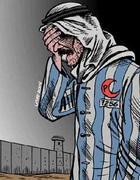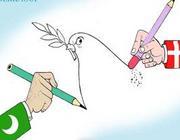
Note: Translation cleaned up and republished on 11 Feb 2006, 10:45 EST.
The Religion columnist for
Le Monde is the incredibly well-prepared Henri Tincq. His normal beat is the Vatican, but today he
writes on the Jyllands-Posten Cartoon Scandal. Tincq believes that Arab governments have domesticated the Islamic academy by undermining its authority and finally silencing it, leaving fertile ground for lunatics and mavericks: the Arab version of the televangelists. The Umma has been cast adrift, and left to the lone wolves of fanaticism. And there's more...
Muhammad: The Clash of IgnoranceHenri Tincq LE MONDE 10.02.06
Once again, we’re back to the same old story. Twenty years after the Rushdie affair, the clash between the West, bent on defending its freedoms, and Islam, rising up against the blasphemy, is repeating itself. It’s as if no one learned a lesson from that major crisis, which, already in 1989, opposed the heirs of Voltaire, Rousseau, and the Rights of Man to the fanatics of Islamic obscurantism. Within the span of twenty years, neither the escalation of terrorism, nor diplomatic efforts nor bridges built to facilitate dialog have had the slightest impact on the misunderstanding, ignorance and hysterical blindness on the one side and the rejection of all self-criticism on the other.
In the 1989 Rushdie affair, the anger of the mosques began in Manchester (Great Britain) and spread from there to Pakistan, even before being politicized by Khomeini’s Iran. The shockwave of the caricatures of Mohammad originated in Norway — where the cartoons printed six months earlier in a Danish tabloid appeared in the January issue of the Norwegian Christian magazine, [
Magazinet] — and hit Saudi Arabia first. In both cases, the spark was the same. The novelist Salman Rushdie and the Danish caricaturists dared to challenge the taboo
par excellence: the sacred, which, according [French philosopher, historian and philologist] René Girard, has always served to justify, legitimize and regulate the violence of every society, ancient or modern.
Should freedom of expression end at the frontier of what is sacred or not? Whether for the sake of fiction or derision, symbols and figures like that of The Prophet cannot be manipulated without consequence. The prophetic figure is a paradigm common to all theologies based on divine Revelation. The proof was seen in the rapidity with which Christian and Jewish officials leapt to the defense of Muslims, outraged by the caricatures of their Prophet. In the reaction, the “corporatist” reflex of religious institutions or their solidarity in confronting secularized societies, which, right or wrong, are perceived as hostile, are not the sole elements. Thus, we are back to the repetition of the same conflict that took place twenty years ago between two imaginary entities, two mutually exclusive systems founded on ignorance. On the one hand, there is the ignorance of the mainsprings of Islam. On the other, creative freedom inside the Arab-Islamic world, where rights and democracy are denied, is unknown. Compounding the conflict are the aggravating circumstances of terrorism, Islamophobia and the decline of traditional regulating institutions of the Muslim faith.
The freedom of the artist or the writer is sacrosanct in the West, but Muslims object to the proposition of the superiority of Western thought, which is incapable of evolving, they say, outside of historical models which it alone has put in place and which took centuries before taking root. “Mental time” is not the same in the West as in Islam. The memory of colonization continues to weigh on these countries, which, for example, feel distanced in relation to their own history since the Christian West, followed by the capitalist and secular West, began to propel into distant orbit and to marginalize the peoples and cultures of the Mediterranean and later, the entire world.
The clash between two types of memory and representation is kept alive by an entire arsenal of images and arguments which explain and legitimize the confrontations of the present. Mohamed Arkoun, an academic and specialist in the history of Islamic thought, is surprised that the representation of Christian Europe inside the Muslim mind — fed by the memory of the Crusades — occupies more space than the English and French revolutions, which
enshrined a decisive rupture with religious symbolism and led to the coming of Reason and The Enlightenment, as yet unpondered in Muslim thought. The disproportionate reaction in the affair of the cartoons of the Prophet Muhammad is due to the extreme febrility of Muslim societies, where, following the nationalist and socialist phase, religion with all its explosive force has become a substitute identity. Islam has become the prime crystallizing element of solidarity in the defense against political oppression, war, misery, and stigmatization. In this context, only the ulema, the scholars and jurisprudents can treat with questions posed by the right to caricaturize, by the status of the figurative image in Islam, by blasphemy and its punishment and with all the questions associated with the integration of the Muslim religion into Western, secularized societies.
But who is there today who can say “enough” to the wretched state of theological reflection in Islam? The “Doctors of the Law” keep their heads down and remain silent. Once all-powerful in the interpretation of texts, they have become domesticated by political authorities and are but a mere shadow of themselves. Today, any individual with an Internet server and network access believes himself authorized to preach, to comment on events or even to pronounce fatwas. They are known as the
i-muftis or
tele-imams, who issue injunctions at the demand of their clientele. They are beyond the control of traditional institutions (universities, etc.) where
ijma, the search for consensus among the doctors of the law, once reigned supreme. In the current situation,
ijtihad, — that is, the individual establishment of norms where the texts are silent — has disappeared. It is commonplace to hear that
the gates of ijtihad, that is, the rational interpretation of revealed text, have been closed since fourteenth century. Today, religious Islam is confronted by multiple crises of interpretation and authority in the worst political conditions possible.
Western derision on the one hand and the paralyzed state of thought on the other can only stoke the sense of victimization by the Umma (the worldwide Muslim community) which is the bread and butter of the radicals. The affair of the caricatures has served above all to reveal the accumulation of suffering and frustration, with no end in sight, churned by place-names which read like a litany: Iraq, Palestine, Chechnya, Kosovo, Bosnia. However, in each case, the political and religious circumstances are different. Osama bin Laden has become a master at mobilizing this suffering and humiliated Islam. In the absence of any intellectual challenge, the game played by the extremists consists of pursing the clash of civilizations, cultures, and religions by anchoring themselves in the historicity of the acts of the Prophet, in raw interpretation of the most bellicose verses of the Koran, and in the void of historical and critical interpretation. A speed challenge has emerged between the radicals and so-called moderate Islam, which would like to appropriate the best of Islam’s humanist tradition from its classical age. Today it no longer has the means, but it would be perilous hold moderate Islam hostage of cartoons in bad taste.







